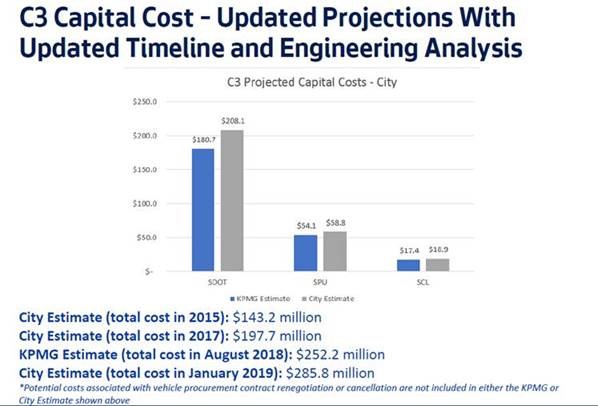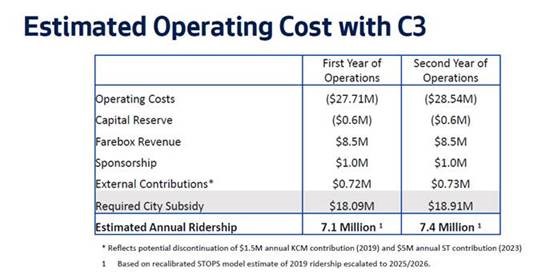
Mayor Durkan to Work with the City Council, Community Members, Businesses and Transit Partners to Move Forward on this Mobility Project to Connect New Waterfront with City
Seattle (January 17, 2019) – Following the conclusion of an engineering analysis and verification of operating costs, the City released updated capital and operating projections for the City Center Connector (C3) streetcar.
In March 2018, Mayor Jenny A. Durkan ordered an independent review of the Center City Connector following a series of reviews from the Seattle Department of Transportation (SDOT) and media reports that found significant shortfalls with operating and capital costs. The initial independent review found that the C3 capital costs would be approximately $252.2 million, up from $197.7 million in the budget passed in 2017. KPMG and SDOT recommended additional engineering analysis and design work to review necessary design changes to integrate the full streetcar system, including, but not limited to, platform design, rail vehicle suitability (rail car length, weight, and dynamic envelope), and impact on maintenance facilities.
Based on that analysis, the total design, construction, and integration costs for the C3 project – including SDOT, Seattle Public Utilities, and Seattle City Light – now would be approximately $286 million, an $88 million difference from the budget passed in 2017.
If Federal Transit Administration funding is not secured or if the City is required to demonstrate full funding, the total funding gap would be $140 million. In September, the City continued moving forward with our grant application by submitting our Federal Transit Administration Capital Investments Grants program application. In December, the Federal Transit Administration released their updated program tables that showed the proposed C3 continues to be eligible for the $75 million Small Starts grant. Mayor Durkan continues to work with the region’s Congressional delegation to ensure Seattle receives the $75 million Federal Transit Administration grant to help build this project.
As part of the 2019 budget process, the City Council inserted a budget provision requiring Council approval of the Center City Connector (C3) construction plans.
Understanding the true costs for building and operating the Center City Connector, Mayor Durkan will work with community members, members of the City Council, transit partners, businesses, and stakeholders to move forward on this significant mobility project and identify resources to close the capital shortfall.
“We are at a critical juncture in building Seattle for the next generation. Together, our City has embarked on a range of projects that will change the face of Seattle. For a period of years, our downtown will be ‘under construction,’ and we will make historic investments in building a city of the future, like our new waterfront park, a new convention center, and a reborn Seattle Center Arena. As we reconnect downtown with our new Waterfront for All, we have the opportunity to create a downtown with fewer cars and where residents, workers, and visitors can walk, bike, and take transit. A unified streetcar route provides a unique opportunity to build on our investments for the next generation,” said Mayor Durkan. “From MOHAI to Pike Place Market to the Wing Luke Museum, we have the chance to connect communities and preserve the best of Seattle while building greater climate friendly mobility and a more vibrant, equitable city center. By connecting the First Hill and South Lake Union lines with the new Center City Connector, millions of people will have the opportunity to use a complete system and create easier access to our waterfront, South Lake Union, the new arena, Pioneer Square, and Chinatown-International District.”
To better understand the capital and operating costs, SDOT’s design firm for the streetcar, Parsons and HDR, conducted an engineering analysis on the integration of the proposed new streetcar vehicles with existing and future lines. The Parsons report, validated by engineers at SDOT, concluded that modifications to platforms, rail track, and the maintenance facility and bridge strengthening would cost an estimated $11 million to $17.4 million. Costs for SDOT are estimated at $208.1 million and the critical and long overdue utility work is estimated at $77.7 million. In 2017, the City estimated the project would cost $197.7 million, which was part of the budget passed by the City Council in November 2017. Currently, SDOT is facing a $65 million capital shortfall on C3, and the utilities have approximately $23 million difference from the 2018 budget, for a total of $88 million.
In addition, SDOT has worked closely with King County Metro to verify operating costs moving forward for the C3. Depending on farebox revenue and contributions from Sound Transit and King County Metro, those operating costs will total approximately $18 million to $19 million in the first year of operations.
In Mayor Durkan’s 2019 budget, she took significant steps to put the operating costs of the streetcar on better financial footing for years to come by both identifying additional resources for operating costs of the current streetcar until 2024 and by beginning the repayment of capital loans.

